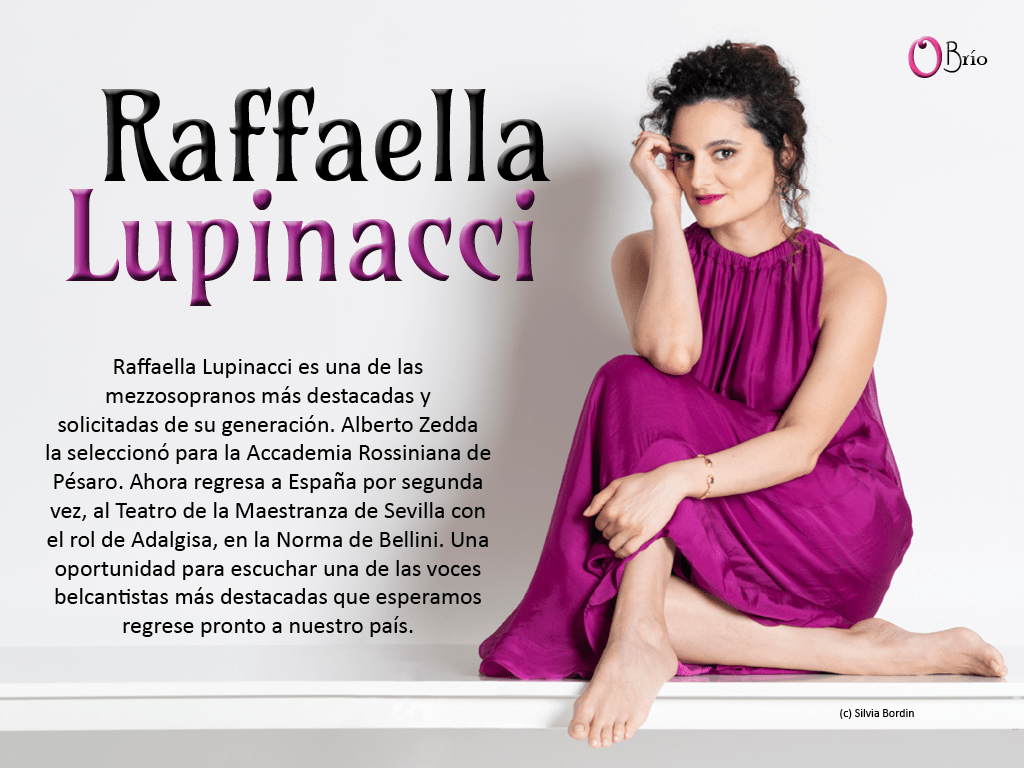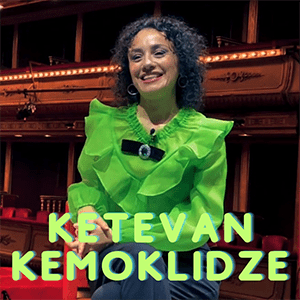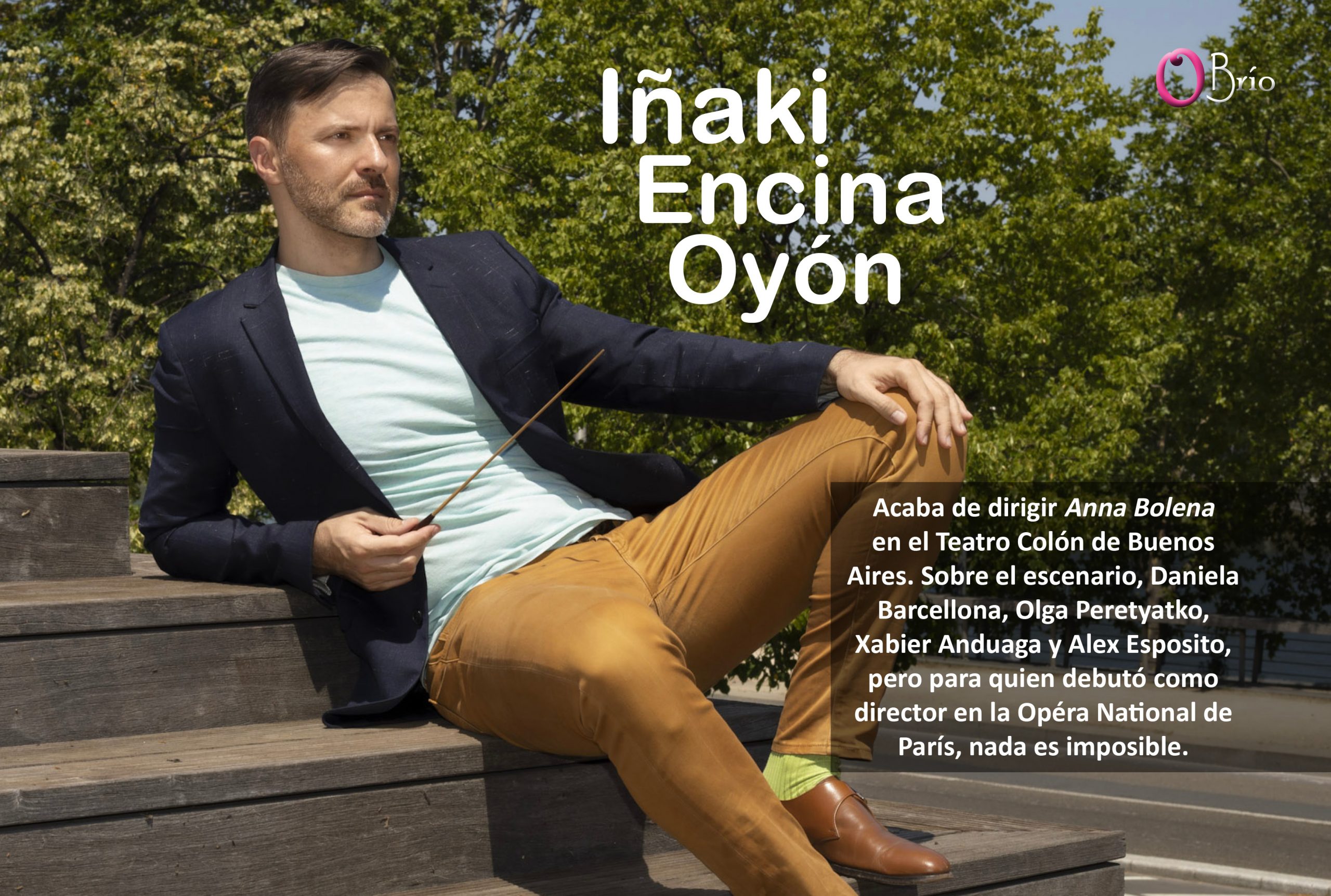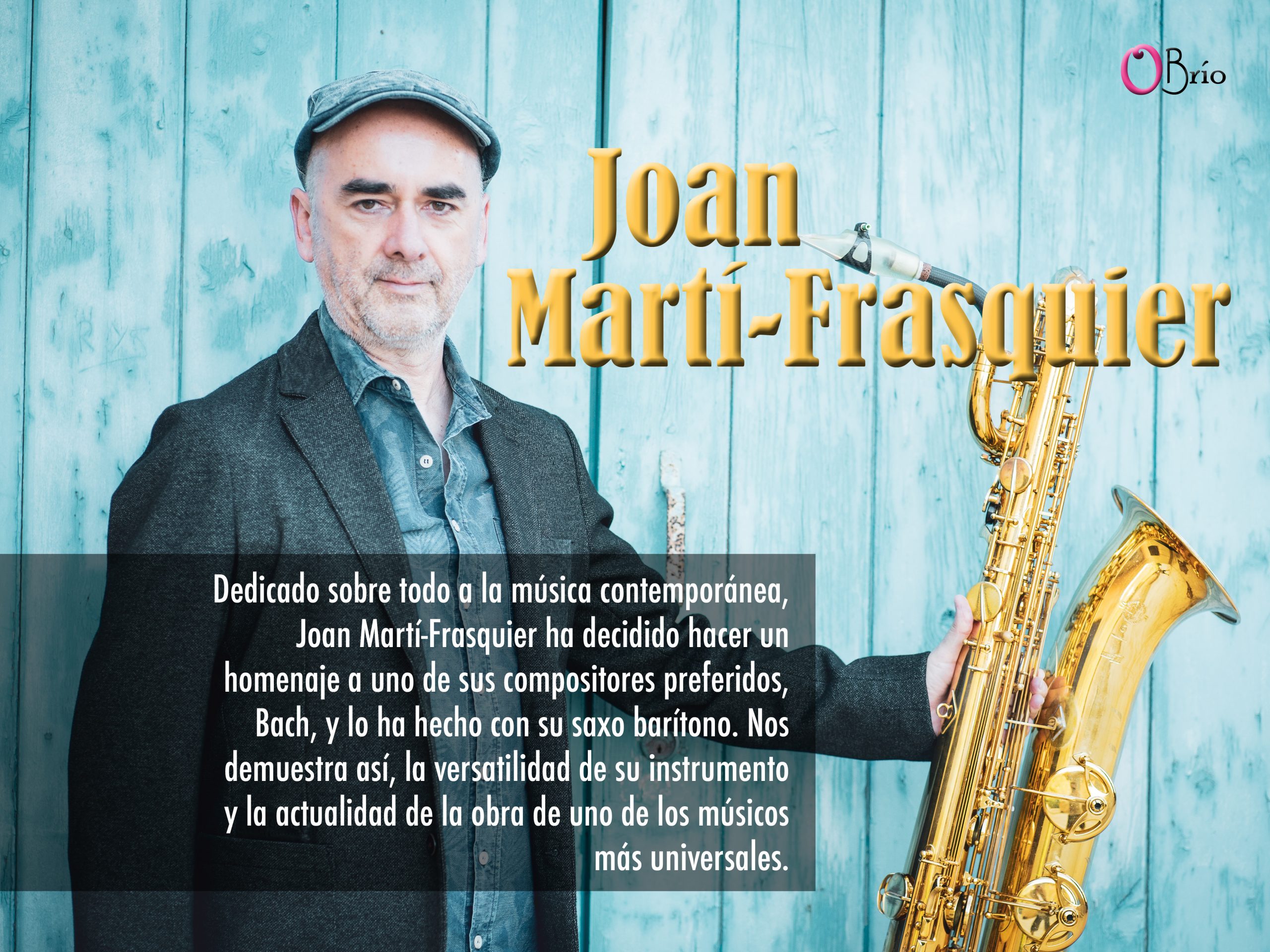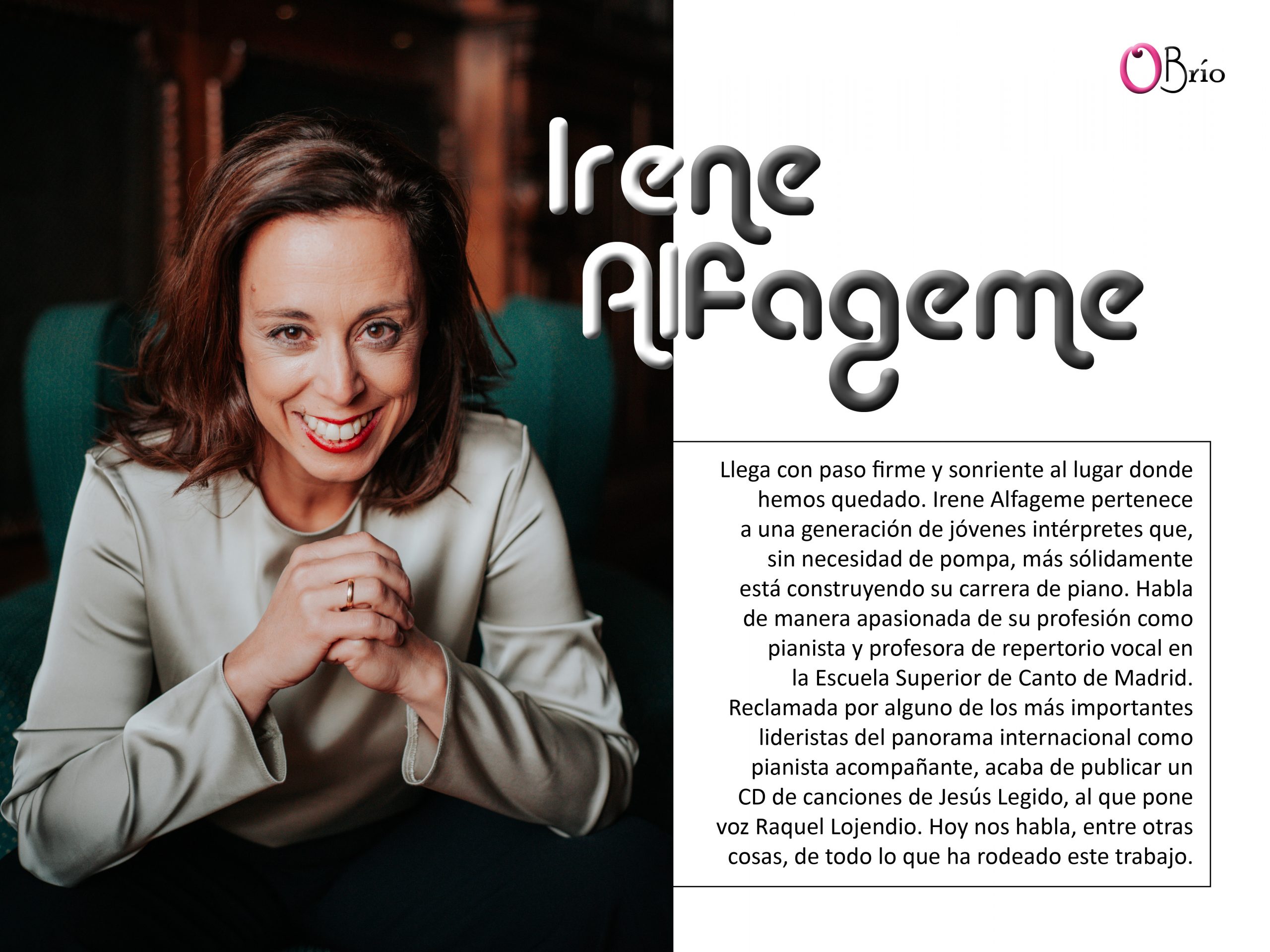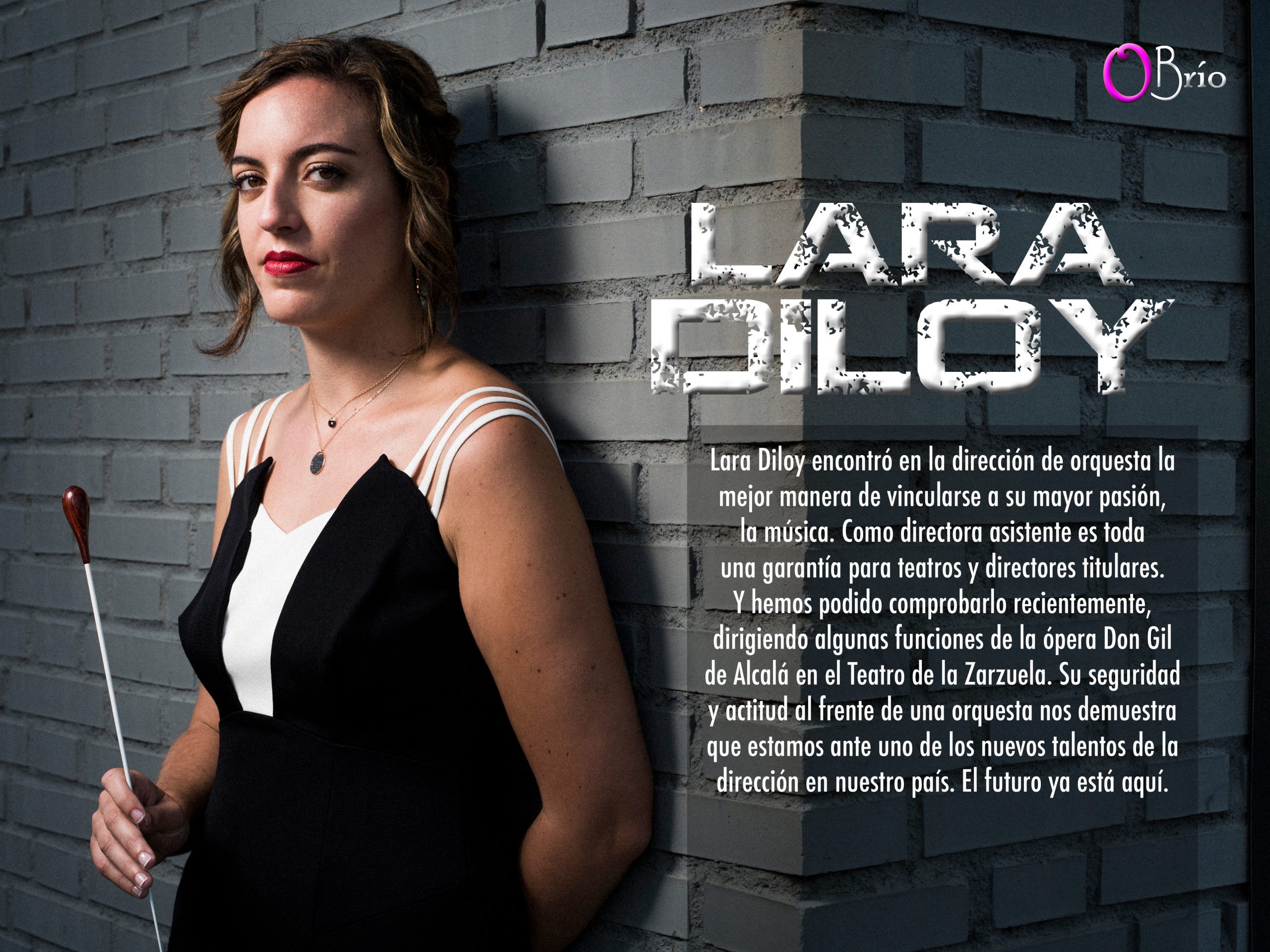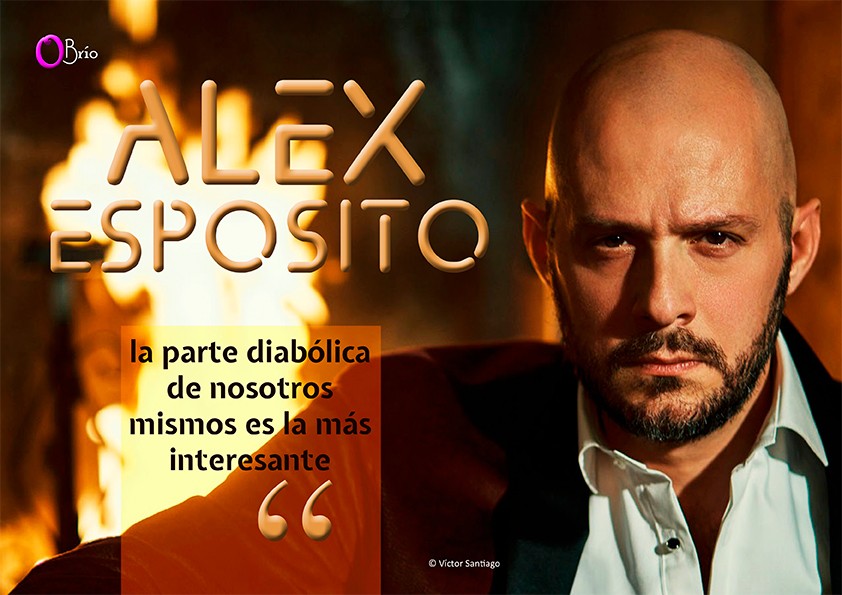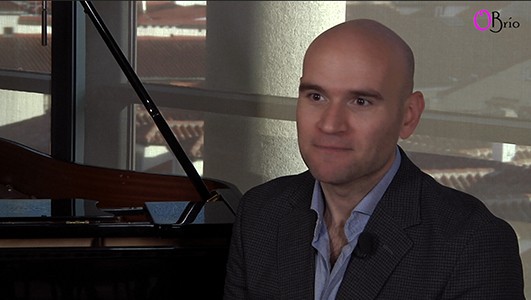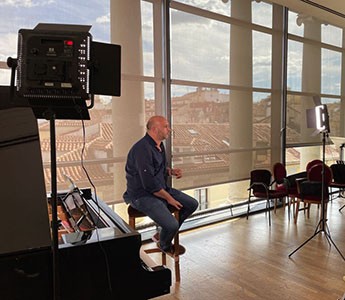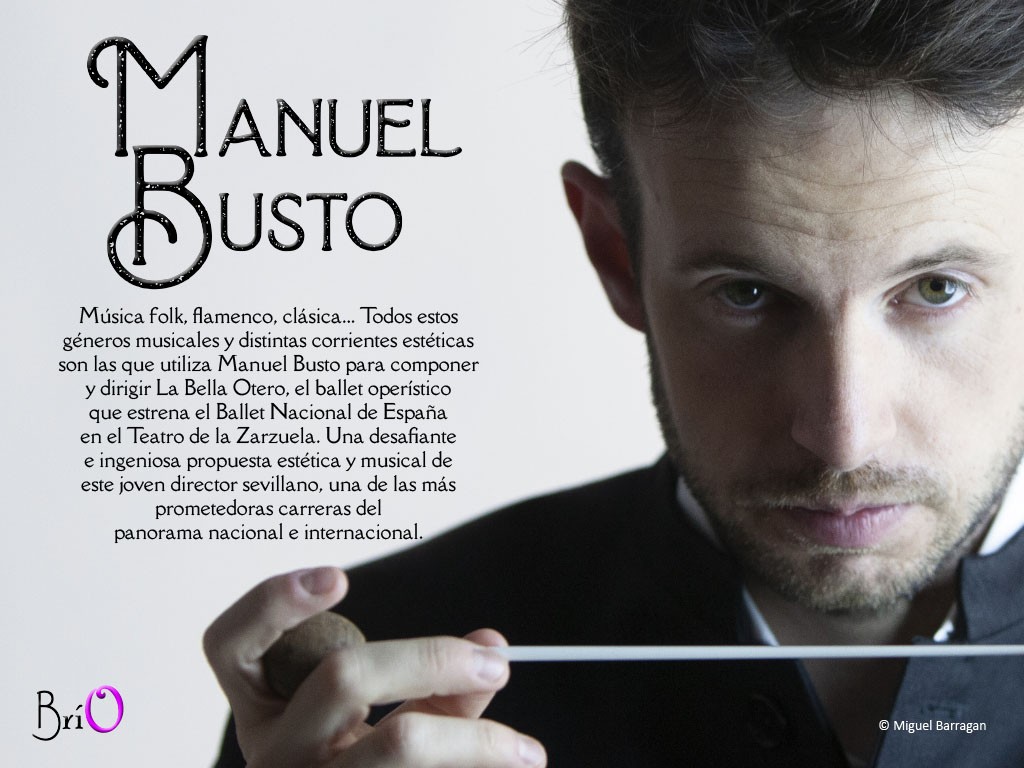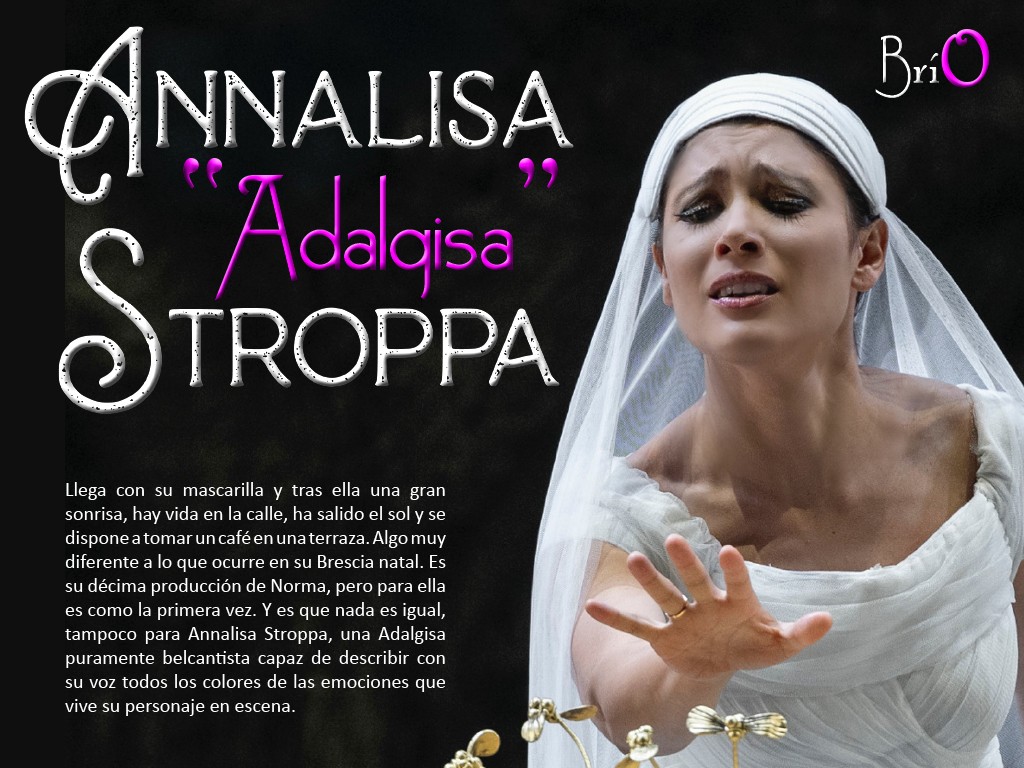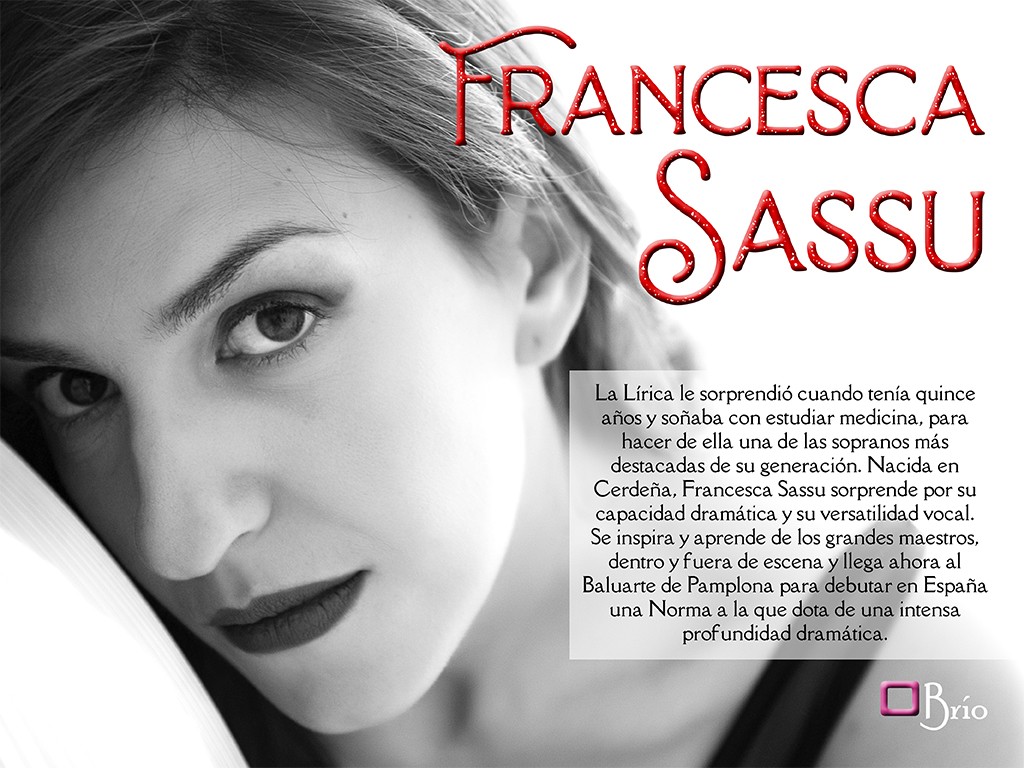Entrevista al baritono Franco Vassallo
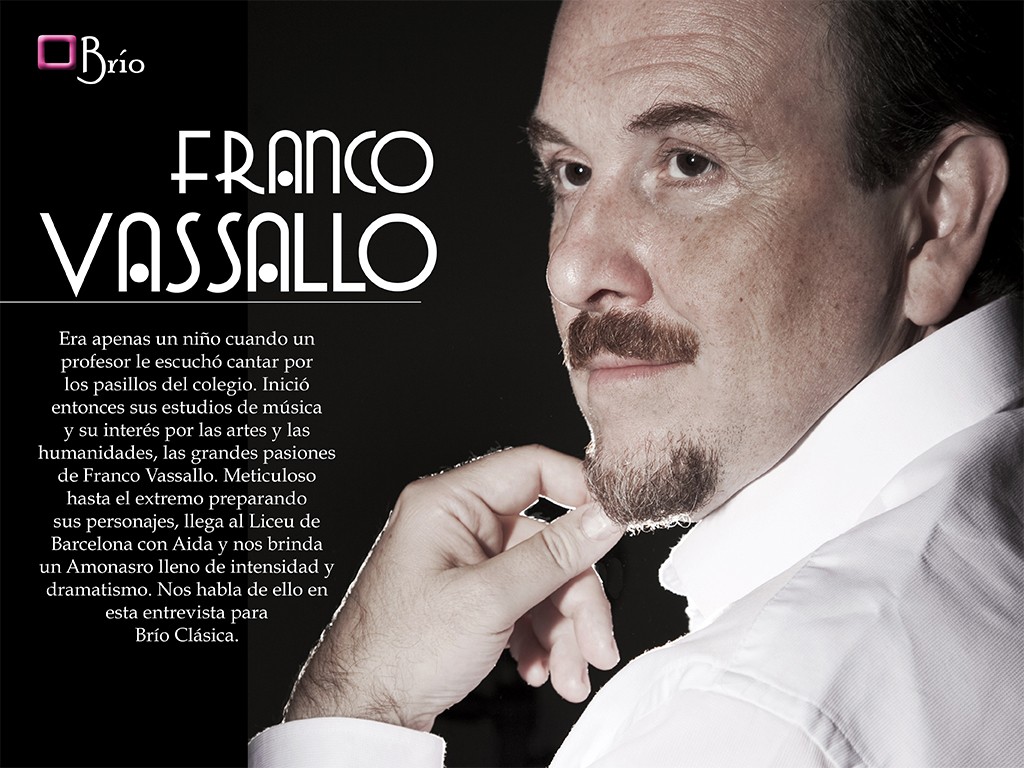
Entrevista Franco Vassallo
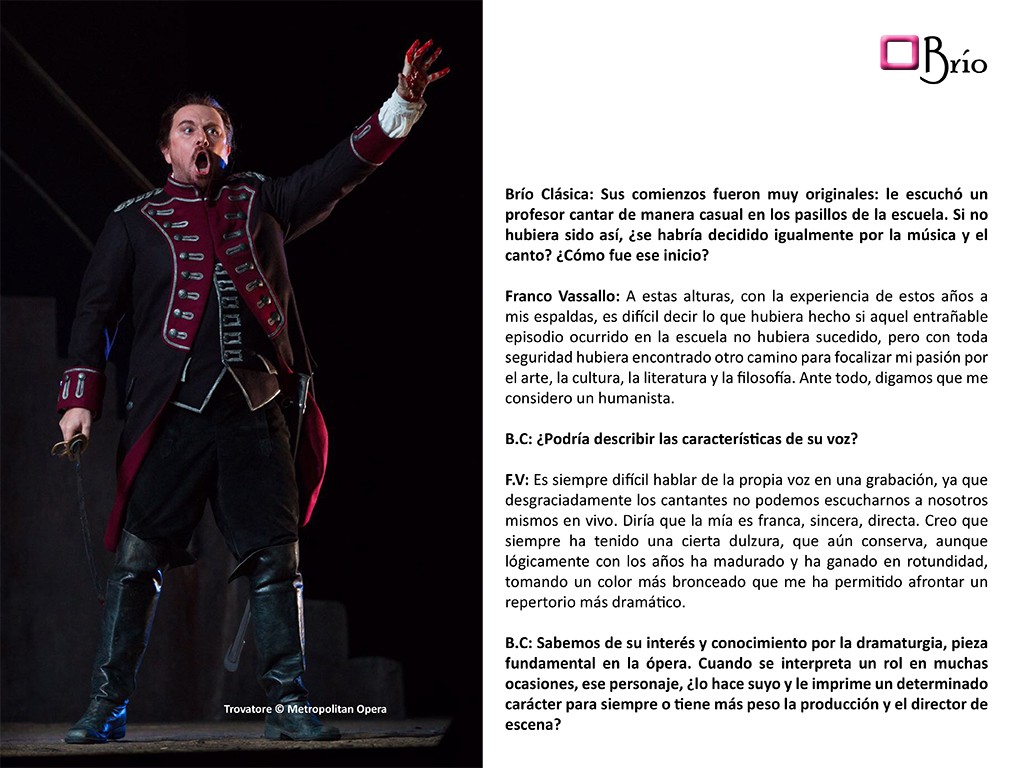
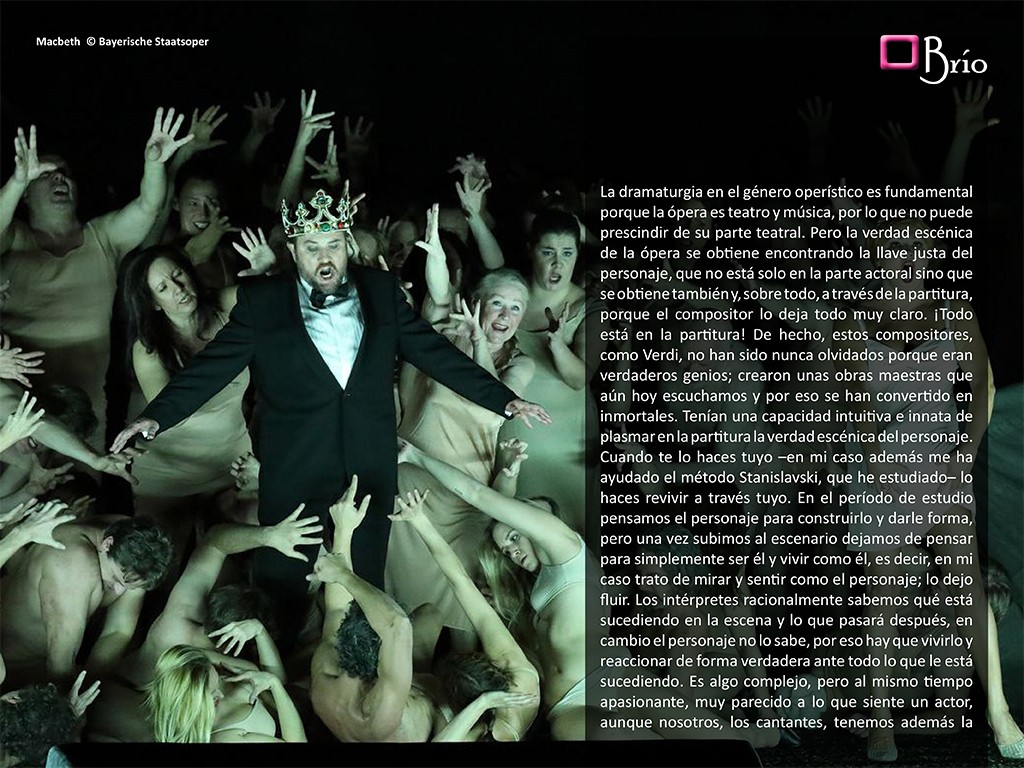
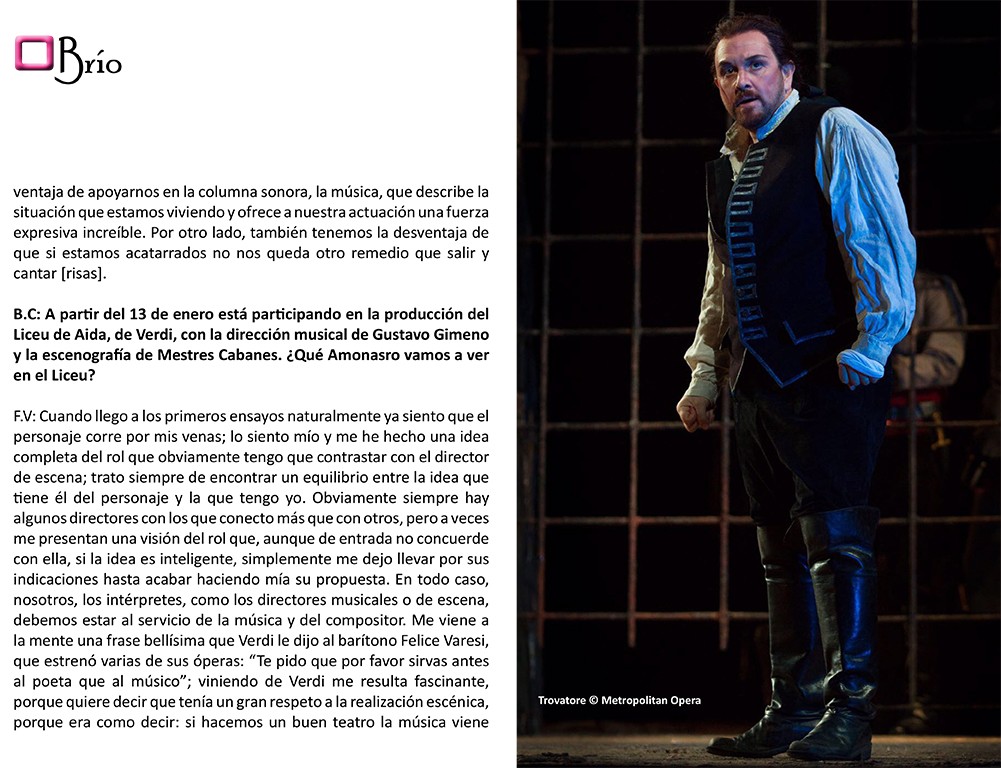
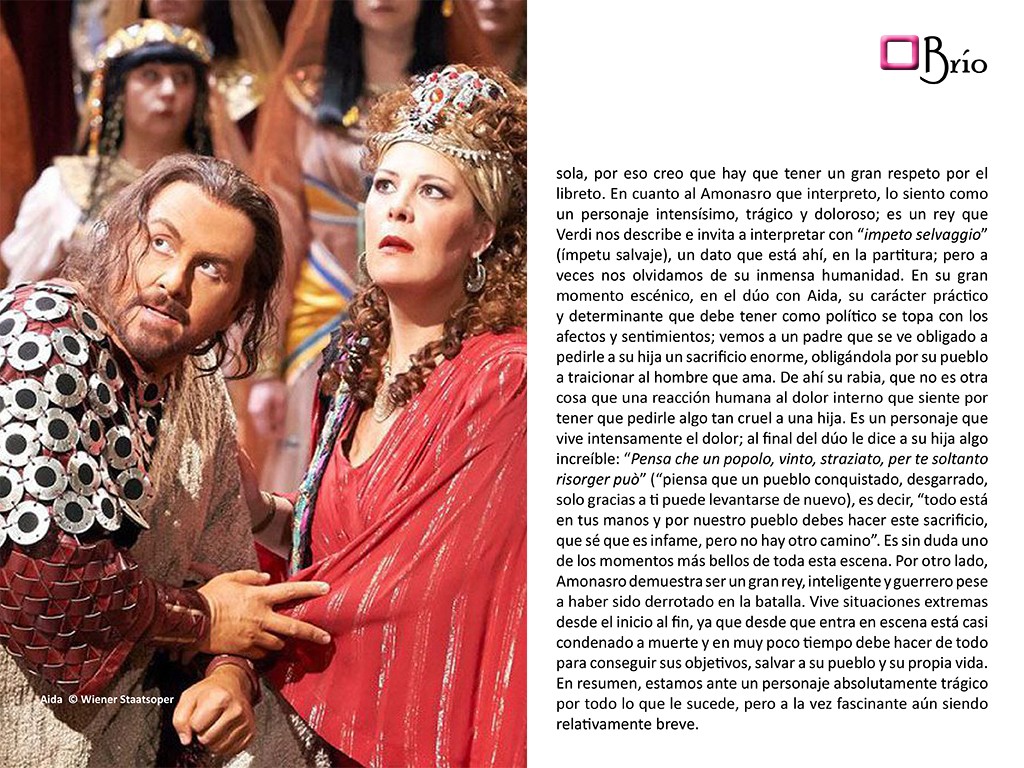
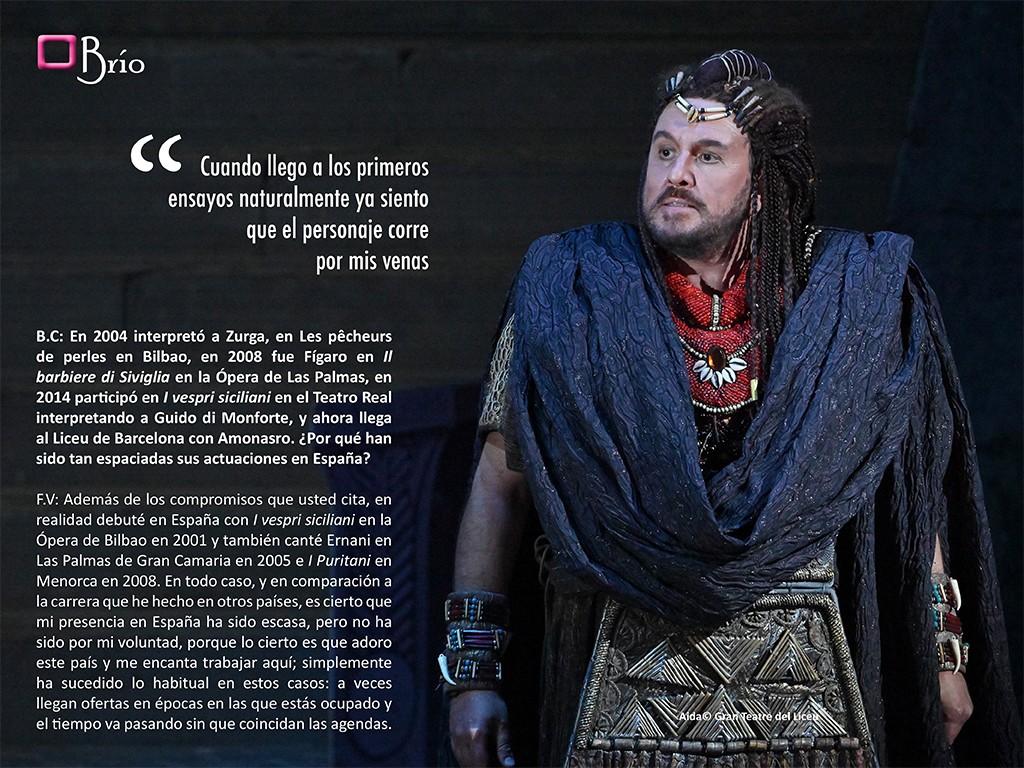
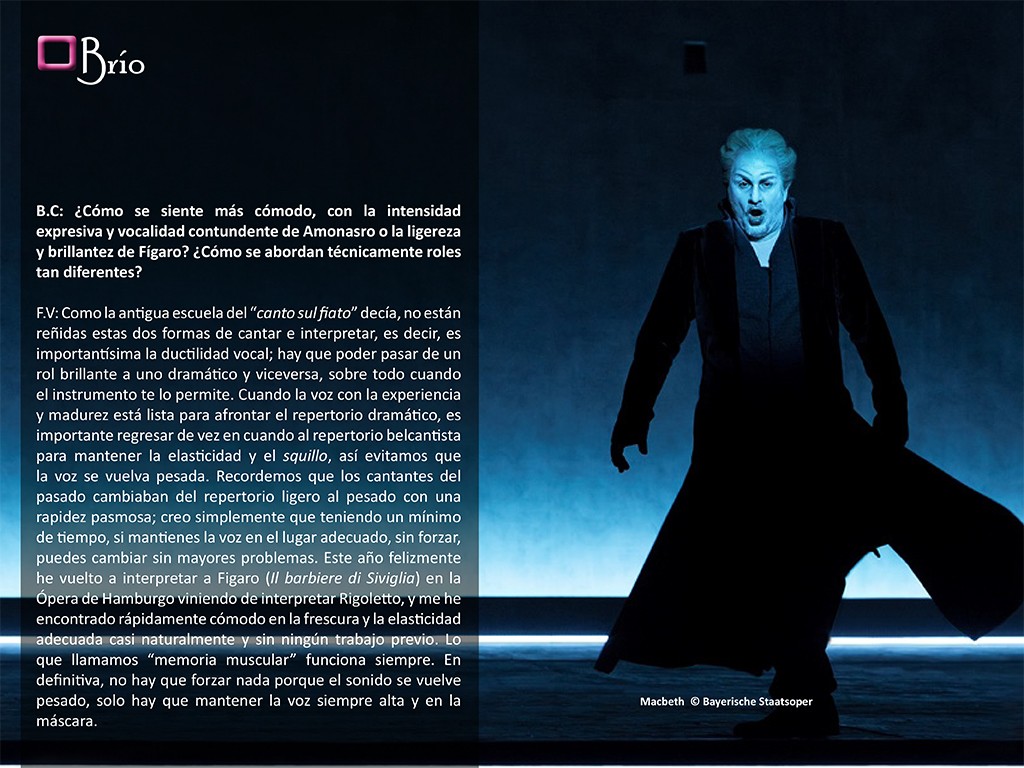
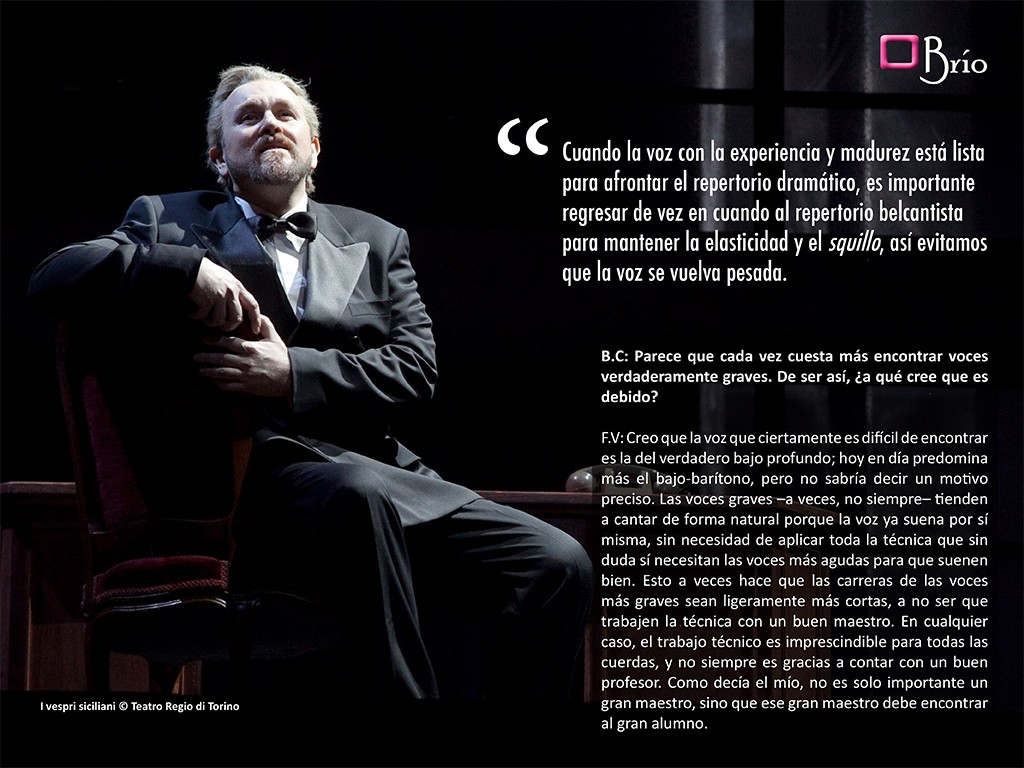
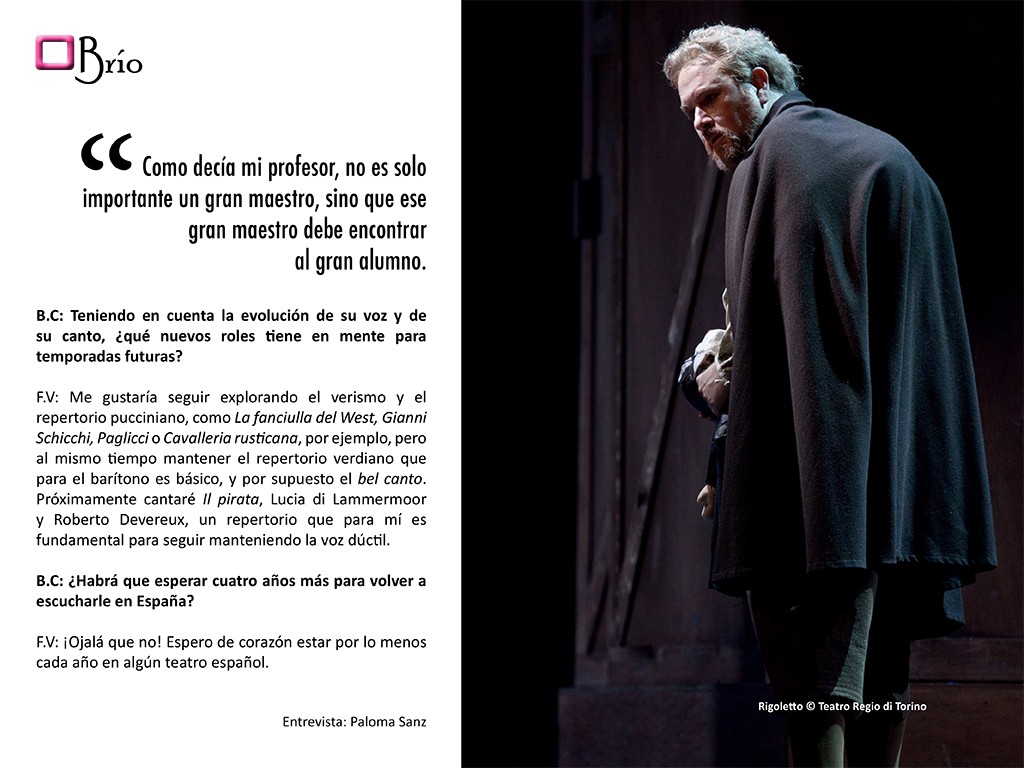
Era apenas un niño cuando un profesor le escuchó cantar por los pasillos del colegio. Inició entonces sus estudios de música y su interés por las artes y las humanidades, las grandes pasiones de Franco Vassallo. Meticuloso hasta el extremo preparando sus personajes, llega al Liceu de Barcelona con Aida y nos brinda un Amonasro lleno de intensidad y dramatismo. Nos habla de ello en esta entrevista para
Brío Clásica.
ENTREVISTA FRANCO VASSALLO / BRÍO CLÁSICA
B.C: Sus comienzos fueron muy originales: le escuchó un profesor cantar de manera casual en los pasillos de la escuela. Si no hubiera sido así, ¿se habría decidido igualmente por la música y el canto? ¿Cómo fue ese inicio?
F.V: A estas alturas, con la experiencia de estos años a mis espaldas, es difícil decir lo que hubiera hecho si aquel entrañable episodio ocurrido en la escuela no hubiera sucedido, pero con toda seguridad hubiera encontrado otro camino para focalizar mi pasión por el arte, la cultura, la literatura y la filosofía. Ante todo, digamos que me considero un humanista.
B.C: ¿Podría describir las características de su voz?
F.V: Es siempre difícil hablar de la propia voz en una grabación, ya que desgraciadamente los cantantes no podemos escucharnos a nosotros mismos en vivo. Diría que la mía es franca, sincera, directa. Creo que siempre ha tenido una cierta dulzura, que aún conserva, aunque lógicamente con los años ha madurado y ha ganado en rotundidad, tomando un color más bronceado que me ha permitido afrontar un repertorio más dramático.
B.C: Sabemos de su interés y conocimiento por la dramaturgia, pieza fundamental en la ópera. Cuando se interpreta un rol en muchas ocasiones, ese personaje, ¿lo hace suyo y le imprime un determinado carácter para siempre o tiene más peso la producción y el director de escena?
F.V: La dramaturgia en el género operístico es fundamental porque la ópera es teatro y música, por lo que no puede prescindir de su parte teatral. Pero la verdad escénica de la ópera se obtiene encontrando la llave justa del personaje, que no está solo en la parte actoral sino que se obtiene también y, sobre todo, a través de la partitura, porque el compositor lo deja todo muy claro. ¡Todo está en la partitura! De hecho, estos compositores, como Verdi, no han sido nunca olvidados porque eran verdaderos genios; crearon unas obras maestras que aún hoy escuchamos y por eso se han convertido en inmortales. Tenían una capacidad intuitiva e innata de plasmar en la partitura la verdad escénica del personaje. Cuando te lo haces tuyo –en mi caso además me ha ayudado el método Stanislavski, que he estudiado– lo haces revivir a través tuyo. En el período de estudio pensamos el personaje para construirlo y darle forma, pero una vez subimos al escenario dejamos de pensar para simplemente ser él y vivir como él, es decir, en mi caso trato de mirar y sentir como el personaje; lo dejo fluir. Los intérpretes racionalmente sabemos qué está sucediendo en la escena y lo que pasará después, en cambio el personaje no lo sabe, por eso hay que vivirlo y reaccionar de forma verdadera ante todo lo que le está sucediendo. Es algo complejo, pero al mismo tiempo apasionante, muy parecido a lo que siente un actor, aunque nosotros, los cantantes, tenemos además la ventaja de apoyarnos en la columna sonora, la música, que describe la situación que estamos viviendo y ofrece a nuestra actuación una fuerza expresiva increíble. Por otro lado, también tenemos la desventaja de que si estamos acatarrados no nos queda otro remedio que salir y cantar [risas].
B.C: A partir del 13 de enero está participando en la producción del Liceu de Aida, de Verdi, con la dirección musical de Gustavo Gimeno y la escenografía de Mestres Cabanes. ¿Qué Amonasro vamos a ver en el Liceu?
F.V: Cuando llego a los primeros ensayos naturalmente ya siento que el personaje corre por mis venas; lo siento mío y me he hecho una idea completa del rol que obviamente tengo que contrastar con el director de escena; trato siempre de encontrar un equilibrio entre la idea que tiene él del personaje y la que tengo yo. Obviamente siempre hay algunos directores con los que conecto más que con otros, pero a veces me presentan una visión del rol que, aunque de entrada no concuerde con ella, si la idea es inteligente, simplemente me dejo llevar por sus indicaciones hasta acabar haciendo mía su propuesta. En todo caso, nosotros, los intérpretes, como los directores musicales o de escena, debemos estar al servicio de la música y del compositor. Me viene a la mente una frase bellísima que Verdi le dijo al barítono Felice Varesi, que estrenó varias de sus óperas: “Te pido que por favor sirvas antes al poeta que al músico”; viniendo de Verdi me resulta fascinante, porque quiere decir que tenía un gran respeto a la realización escénica, porque era como decir: si hacemos un buen teatro la música viene sola, por eso creo que hay que tener un gran respeto por el libreto. En cuanto al Amonasro que interpreto, lo siento como un personaje intensísimo, trágico y doloroso; es un rey que Verdi nos describe e invita a interpretar con “impeto selvaggio” (ímpetu salvaje), un dato que está ahí, en la partitura; pero a veces nos olvidamos de su inmensa humanidad. En su gran momento escénico, en el dúo con Aida, su carácter práctico y determinante que debe tener como político se topa con los afectos y sentimientos; vemos a un padre que se ve obligado a pedirle a su hija un sacrificio enorme, obligándola por su pueblo a traicionar al hombre que ama. De ahí su rabia, que no es otra cosa que una reacción humana al dolor interno que siente por tener que pedirle algo tan cruel a una hija. Es un personaje que vive intensamente el dolor; al final del dúo le dice a su hija algo increíble: “Pensa che un popolo, vinto, straziato, per te soltanto risorger può” (“piensa que un pueblo conquistado, desgarrado, solo gracias a ti puede levantarse de nuevo), es decir, “todo está en tus manos y por nuestro pueblo debes hacer este sacrificio, que sé que es infame, pero no hay otro camino”. Es sin duda uno de los momentos más bellos de toda esta escena. Por otro lado, Amonasro demuestra ser un gran rey, inteligente y guerrero pese a haber sido derrotado en la batalla. Vive situaciones extremas desde el inicio al fin, ya que desde que entra en escena está casi condenado a muerte y en muy poco tiempo debe hacer de todo para conseguir sus objetivos, salvar a su pueblo y su propia vida. En resumen, estamos ante un personaje absolutamente trágico por todo lo que le sucede, pero a la vez fascinante aún siendo relativamente breve.
B.C: En 2004 interpretó a Zurga, en Les pêcheurs de perles en Bilbao, en 2008 fue Fígaro en Il barbiere di Siviglia en la Ópera de Las Palmas, en 2014 participó en I vespri siciliani en el Teatro Real interpretando a Guido di Monforte, y ahora llega al Liceu de Barcelona con Amonasro. ¿Por qué han sido tan espaciadas sus actuaciones en España?
F.V: Además de los compromisos que usted cita, en realidad debuté en España con I vespri siciliani en la Ópera de Bilbao en 2001 y también canté Ernani en Las Palmas de Gran Camaria en 2005 e I Puritani en Menorca en 2008. En todo caso, y en comparación a la carrera que he hecho en otros países, es cierto que mi presencia en España ha sido escasa, pero no ha sido por mi voluntad, porque lo cierto es que adoro este país y me encanta trabajar aquí; simplemente ha sucedido lo habitual en estos casos: a veces llegan ofertas en épocas en las que estás ocupado y el tiempo va pasando sin que coincidan las agendas.
B.C: ¿Cómo se siente más cómodo, con la intensidad expresiva y vocalidad contundente de Amonasro o la ligereza y brillantez de Fígaro? ¿Cómo se abordan técnicamente roles tan diferentes?
F.V: Como la antigua escuela del “canto sul fiato” decía, no están reñidas estas dos formas de cantar e interpretar, es decir, es importantísima la ductilidad vocal; hay que poder pasar de un rol brillante a uno dramático y viceversa, sobre todo cuando el instrumento te lo permite. Cuando la voz con la experiencia y madurez está lista para afrontar el repertorio dramático, es importante regresar de vez en cuando al repertorio belcantista para mantener la elasticidad y el squillo, así evitamos que la voz se vuelva pesada. Recordemos que los cantantes del pasado cambiaban del repertorio ligero al pesado con una rapidez pasmosa; creo simplemente que teniendo un mínimo de tiempo, si mantienes la voz en el lugar adecuado, sin forzar, puedes cambiar sin mayores problemas. Este año felizmente he vuelto a interpretar a Figaro (Il barbiere di Siviglia) en la Ópera de Hamburgo viniendo de interpretar Rigoletto, y me he encontrado rápidamente cómodo en la frescura y la elasticidad adecuada casi naturalmente y sin ningún trabajo previo. Lo que llamamos “memoria muscular” funciona siempre. En definitiva, no hay que forzar nada porque el sonido se vuelve pesado, solo hay que mantener la voz siempre alta y en la máscara.
B.C: Parece que cada vez cuesta más encontrar voces verdaderamente graves. De ser así, ¿a qué cree que es debido?
F.V: Creo que la voz que ciertamente es difícil de encontrar es la del verdadero bajo profundo; hoy en día predomina más el bajo-barítono, pero no sabría decir un motivo preciso. Las voces graves –a veces, no siempre– tienden a cantar de forma natural porque la voz ya suena por sí misma, sin necesidad de aplicar toda la técnica que sin duda sí necesitan las voces más agudas para que suenen bien. Esto a veces hace que las carreras de las voces más graves sean ligeramente más cortas, a no ser que trabajen la técnica con un buen maestro. En cualquier caso, el trabajo técnico es imprescindible para todas las cuerdas, y no siempre es gracias a contar con un buen profesor. Como decía el mío, no es solo importante un gran maestro, sino que ese gran maestro debe encontrar al gran alumno.
B.C: Teniendo en cuenta la evolución de su voz y de su canto, ¿qué nuevos roles tiene en mente para temporadas futuras?
F.V: Me gustaría seguir explorando el verismo y el repertorio pucciniano, como La fanciulla del West, Gianni Schicchi, Paglicci o Cavalleria rusticana, por ejemplo, pero al mismo tiempo mantener el repertorio verdiano que para el barítono es básico, y por supuesto el bel canto. Próximamente cantaré Il pirata, Lucia di Lammermoor y Roberto Devereux, un repertorio que para mí es fundamental para seguir manteniendo la voz dúctil.
B.C: ¿Habrá que esperar cuatro años más para volver a escucharle en España?
F.V: ¡Ojalá que no! Espero de corazón estar por lo menos cada año en algún teatro español.
Brío Clásica.
ENTREVISTA FRANCO VASSALLO / BRÍO CLÁSICA
B.C: Sus comienzos fueron muy originales: le escuchó un profesor cantar de manera casual en los pasillos de la escuela. Si no hubiera sido así, ¿se habría decidido igualmente por la música y el canto? ¿Cómo fue ese inicio?
F.V: A estas alturas, con la experiencia de estos años a mis espaldas, es difícil decir lo que hubiera hecho si aquel entrañable episodio ocurrido en la escuela no hubiera sucedido, pero con toda seguridad hubiera encontrado otro camino para focalizar mi pasión por el arte, la cultura, la literatura y la filosofía. Ante todo, digamos que me considero un humanista.
B.C: ¿Podría describir las características de su voz?
F.V: Es siempre difícil hablar de la propia voz en una grabación, ya que desgraciadamente los cantantes no podemos escucharnos a nosotros mismos en vivo. Diría que la mía es franca, sincera, directa. Creo que siempre ha tenido una cierta dulzura, que aún conserva, aunque lógicamente con los años ha madurado y ha ganado en rotundidad, tomando un color más bronceado que me ha permitido afrontar un repertorio más dramático.
B.C: Sabemos de su interés y conocimiento por la dramaturgia, pieza fundamental en la ópera. Cuando se interpreta un rol en muchas ocasiones, ese personaje, ¿lo hace suyo y le imprime un determinado carácter para siempre o tiene más peso la producción y el director de escena?
F.V: La dramaturgia en el género operístico es fundamental porque la ópera es teatro y música, por lo que no puede prescindir de su parte teatral. Pero la verdad escénica de la ópera se obtiene encontrando la llave justa del personaje, que no está solo en la parte actoral sino que se obtiene también y, sobre todo, a través de la partitura, porque el compositor lo deja todo muy claro. ¡Todo está en la partitura! De hecho, estos compositores, como Verdi, no han sido nunca olvidados porque eran verdaderos genios; crearon unas obras maestras que aún hoy escuchamos y por eso se han convertido en inmortales. Tenían una capacidad intuitiva e innata de plasmar en la partitura la verdad escénica del personaje. Cuando te lo haces tuyo –en mi caso además me ha ayudado el método Stanislavski, que he estudiado– lo haces revivir a través tuyo. En el período de estudio pensamos el personaje para construirlo y darle forma, pero una vez subimos al escenario dejamos de pensar para simplemente ser él y vivir como él, es decir, en mi caso trato de mirar y sentir como el personaje; lo dejo fluir. Los intérpretes racionalmente sabemos qué está sucediendo en la escena y lo que pasará después, en cambio el personaje no lo sabe, por eso hay que vivirlo y reaccionar de forma verdadera ante todo lo que le está sucediendo. Es algo complejo, pero al mismo tiempo apasionante, muy parecido a lo que siente un actor, aunque nosotros, los cantantes, tenemos además la ventaja de apoyarnos en la columna sonora, la música, que describe la situación que estamos viviendo y ofrece a nuestra actuación una fuerza expresiva increíble. Por otro lado, también tenemos la desventaja de que si estamos acatarrados no nos queda otro remedio que salir y cantar [risas].
B.C: A partir del 13 de enero está participando en la producción del Liceu de Aida, de Verdi, con la dirección musical de Gustavo Gimeno y la escenografía de Mestres Cabanes. ¿Qué Amonasro vamos a ver en el Liceu?
F.V: Cuando llego a los primeros ensayos naturalmente ya siento que el personaje corre por mis venas; lo siento mío y me he hecho una idea completa del rol que obviamente tengo que contrastar con el director de escena; trato siempre de encontrar un equilibrio entre la idea que tiene él del personaje y la que tengo yo. Obviamente siempre hay algunos directores con los que conecto más que con otros, pero a veces me presentan una visión del rol que, aunque de entrada no concuerde con ella, si la idea es inteligente, simplemente me dejo llevar por sus indicaciones hasta acabar haciendo mía su propuesta. En todo caso, nosotros, los intérpretes, como los directores musicales o de escena, debemos estar al servicio de la música y del compositor. Me viene a la mente una frase bellísima que Verdi le dijo al barítono Felice Varesi, que estrenó varias de sus óperas: “Te pido que por favor sirvas antes al poeta que al músico”; viniendo de Verdi me resulta fascinante, porque quiere decir que tenía un gran respeto a la realización escénica, porque era como decir: si hacemos un buen teatro la música viene sola, por eso creo que hay que tener un gran respeto por el libreto. En cuanto al Amonasro que interpreto, lo siento como un personaje intensísimo, trágico y doloroso; es un rey que Verdi nos describe e invita a interpretar con “impeto selvaggio” (ímpetu salvaje), un dato que está ahí, en la partitura; pero a veces nos olvidamos de su inmensa humanidad. En su gran momento escénico, en el dúo con Aida, su carácter práctico y determinante que debe tener como político se topa con los afectos y sentimientos; vemos a un padre que se ve obligado a pedirle a su hija un sacrificio enorme, obligándola por su pueblo a traicionar al hombre que ama. De ahí su rabia, que no es otra cosa que una reacción humana al dolor interno que siente por tener que pedirle algo tan cruel a una hija. Es un personaje que vive intensamente el dolor; al final del dúo le dice a su hija algo increíble: “Pensa che un popolo, vinto, straziato, per te soltanto risorger può” (“piensa que un pueblo conquistado, desgarrado, solo gracias a ti puede levantarse de nuevo), es decir, “todo está en tus manos y por nuestro pueblo debes hacer este sacrificio, que sé que es infame, pero no hay otro camino”. Es sin duda uno de los momentos más bellos de toda esta escena. Por otro lado, Amonasro demuestra ser un gran rey, inteligente y guerrero pese a haber sido derrotado en la batalla. Vive situaciones extremas desde el inicio al fin, ya que desde que entra en escena está casi condenado a muerte y en muy poco tiempo debe hacer de todo para conseguir sus objetivos, salvar a su pueblo y su propia vida. En resumen, estamos ante un personaje absolutamente trágico por todo lo que le sucede, pero a la vez fascinante aún siendo relativamente breve.
B.C: En 2004 interpretó a Zurga, en Les pêcheurs de perles en Bilbao, en 2008 fue Fígaro en Il barbiere di Siviglia en la Ópera de Las Palmas, en 2014 participó en I vespri siciliani en el Teatro Real interpretando a Guido di Monforte, y ahora llega al Liceu de Barcelona con Amonasro. ¿Por qué han sido tan espaciadas sus actuaciones en España?
F.V: Además de los compromisos que usted cita, en realidad debuté en España con I vespri siciliani en la Ópera de Bilbao en 2001 y también canté Ernani en Las Palmas de Gran Camaria en 2005 e I Puritani en Menorca en 2008. En todo caso, y en comparación a la carrera que he hecho en otros países, es cierto que mi presencia en España ha sido escasa, pero no ha sido por mi voluntad, porque lo cierto es que adoro este país y me encanta trabajar aquí; simplemente ha sucedido lo habitual en estos casos: a veces llegan ofertas en épocas en las que estás ocupado y el tiempo va pasando sin que coincidan las agendas.
B.C: ¿Cómo se siente más cómodo, con la intensidad expresiva y vocalidad contundente de Amonasro o la ligereza y brillantez de Fígaro? ¿Cómo se abordan técnicamente roles tan diferentes?
F.V: Como la antigua escuela del “canto sul fiato” decía, no están reñidas estas dos formas de cantar e interpretar, es decir, es importantísima la ductilidad vocal; hay que poder pasar de un rol brillante a uno dramático y viceversa, sobre todo cuando el instrumento te lo permite. Cuando la voz con la experiencia y madurez está lista para afrontar el repertorio dramático, es importante regresar de vez en cuando al repertorio belcantista para mantener la elasticidad y el squillo, así evitamos que la voz se vuelva pesada. Recordemos que los cantantes del pasado cambiaban del repertorio ligero al pesado con una rapidez pasmosa; creo simplemente que teniendo un mínimo de tiempo, si mantienes la voz en el lugar adecuado, sin forzar, puedes cambiar sin mayores problemas. Este año felizmente he vuelto a interpretar a Figaro (Il barbiere di Siviglia) en la Ópera de Hamburgo viniendo de interpretar Rigoletto, y me he encontrado rápidamente cómodo en la frescura y la elasticidad adecuada casi naturalmente y sin ningún trabajo previo. Lo que llamamos “memoria muscular” funciona siempre. En definitiva, no hay que forzar nada porque el sonido se vuelve pesado, solo hay que mantener la voz siempre alta y en la máscara.
B.C: Parece que cada vez cuesta más encontrar voces verdaderamente graves. De ser así, ¿a qué cree que es debido?
F.V: Creo que la voz que ciertamente es difícil de encontrar es la del verdadero bajo profundo; hoy en día predomina más el bajo-barítono, pero no sabría decir un motivo preciso. Las voces graves –a veces, no siempre– tienden a cantar de forma natural porque la voz ya suena por sí misma, sin necesidad de aplicar toda la técnica que sin duda sí necesitan las voces más agudas para que suenen bien. Esto a veces hace que las carreras de las voces más graves sean ligeramente más cortas, a no ser que trabajen la técnica con un buen maestro. En cualquier caso, el trabajo técnico es imprescindible para todas las cuerdas, y no siempre es gracias a contar con un buen profesor. Como decía el mío, no es solo importante un gran maestro, sino que ese gran maestro debe encontrar al gran alumno.
B.C: Teniendo en cuenta la evolución de su voz y de su canto, ¿qué nuevos roles tiene en mente para temporadas futuras?
F.V: Me gustaría seguir explorando el verismo y el repertorio pucciniano, como La fanciulla del West, Gianni Schicchi, Paglicci o Cavalleria rusticana, por ejemplo, pero al mismo tiempo mantener el repertorio verdiano que para el barítono es básico, y por supuesto el bel canto. Próximamente cantaré Il pirata, Lucia di Lammermoor y Roberto Devereux, un repertorio que para mí es fundamental para seguir manteniendo la voz dúctil.
B.C: ¿Habrá que esperar cuatro años más para volver a escucharle en España?
F.V: ¡Ojalá que no! Espero de corazón estar por lo menos cada año en algún teatro español.

